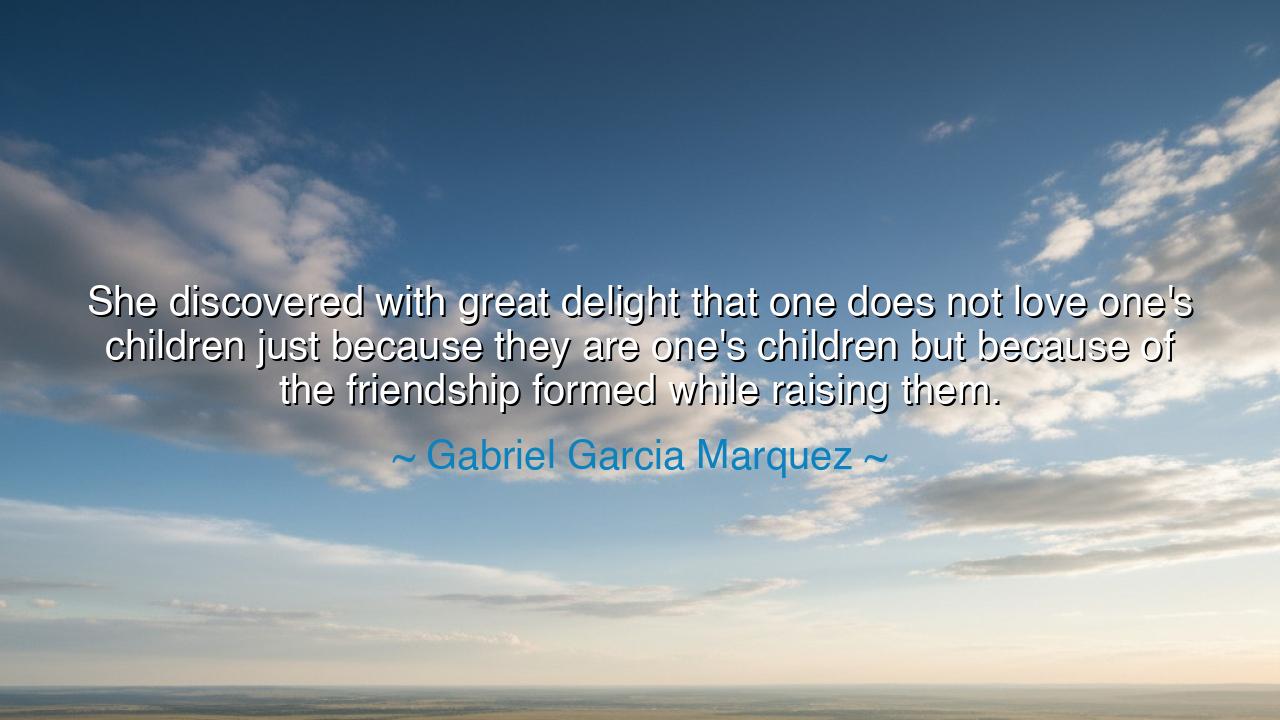
She discovered with great delight that one does not love one's
She discovered with great delight that one does not love one's children just because they are one's children but because of the friendship formed while raising them.






Listen, O seekers of wisdom, to the insight of Gabriel Garcia Marquez, whose words, though soft in their utterance, carry the weight of generations: “One does not love one’s children just because they are one’s children, but because of the friendship formed while raising them.” Here lies a truth as old as time itself, a truth that reveals that love is not merely the product of blood or duty, but the living, breathing bond cultivated through shared moments, trials, and joys. To raise a child is not merely to be a guardian, but to be a companion, a guide, a fellow traveler on the winding road of life.
The origin of this revelation lies in the deep human experience, in the act of nurturing and witnessing growth. From the earliest days, humans understood that parenthood was a sacred trust, yet Marquez illuminates a subtle truth: the strongest affection arises not from mere inheritance of life, but from the conscious forging of companionship, understanding, and shared discovery. Like the ancients, who spoke of the bonds between mentor and pupil, or between comrade and brother-in-arms, so too does true parental love demand recognition of the child as a fellow soul, deserving of respect, curiosity, and friendship.
In the annals of history, we may glimpse such relationships. Consider Abraham Lincoln with his sons, particularly with Robert Todd Lincoln, whose father did not merely command obedience but engaged with them through dialogue, example, and shared concern for justice and virtue. It was in the weaving together of life, thought, and emotion that the seed of friendship between parent and child took root, enriching both the heart of the child and the soul of the parent.
Marquez’s words echo the realization that love grows in companionship, in the shared triumphs of learning, and in the tender exchanges of understanding. When a parent pauses to laugh with a child, to encourage curiosity, to embrace imperfections and celebrate victories, the bond transcends obligation. It becomes a friendship, mutual and sacred, a recognition that each soul, though shaped by different years and experiences, can meet in the space of shared heart.
A real-life example springs from the life of Mahatma Gandhi and his eldest son, Harilal. Though their relationship was fraught with tension at times, there were moments when Gandhi, in teaching, guiding, and confiding, experienced the subtle flowering of friendship. Even amidst conflict, the greatest lessons emerged not from authority alone, but from the willingness to engage, to converse, and to honor the child as a distinct being capable of thought and feeling. Thus, love and friendship intertwined, imperfect but profound.
The ancients knew this well: Aristotle spoke of philia, the kind of love rooted in shared virtue and mutual respect. Parenthood, in its deepest sense, is an exercise in cultivating philia with those we bring into the world. To see a child as merely an extension of oneself is to miss the richness of life; to embrace the child as companion, friend, and co-learner is to awaken the heart to a joy beyond measure.
Let this truth guide the actions of mortal hearts: spend time with your children not merely instructing, but conversing. Listen to their thoughts with genuine curiosity. Play, imagine, and discover alongside them. Cherish the moments when laughter blooms spontaneously, when guidance is met with gratitude, when correction is softened by respect. These are the moments in which friendship and love entwine, creating bonds that endure beyond the years.
Thus, remember Marquez’s wisdom: the highest form of love is not passive, inherited, or assumed—it is earned, nurtured, and shared through the delicate art of companionship. In walking beside your children, in honoring them as friends as well as kin, you cultivate a garden of the heart that bears fruit for a lifetime. Cherish this, for it is the true measure of parenthood and the noblest testament of human connection.






AAdministratorAdministrator
Welcome, honored guests. Please leave a comment, we will respond soon